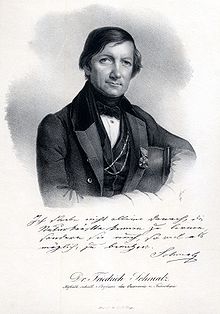Friedrich Schmalz

Johann Friedrich Leberecht Schmalz (born June 25, 1781 in Wildenborn near Zeitz , † May 23, 1847 in Dresden ) was a German agricultural scientist .
Live and act
Friedrich Schmalz, son of a leaseholder, learned practical farming from relatives. In 1804 he leased the Zangenberg manor near Zeitz and in 1806 the Ponitz manor near Altenburg . As an autodidact, he acquired extensive agricultural knowledge. In 1812 he took over the Kussen and Neuweide estates near Gumbinnen ( East Prussia ) on behalf of the Prussian government , which he expanded into profitable model farms despite initial difficulties. At the same time he worked as an editor for agricultural magazines. He also developed a lively journalistic activity. With contributions from all areas of agriculture, he gained a high reputation in East Prussia and throughout the Baltic States.
In 1821 Schmalz became secretary of the Agricultural Society in Lithuania. In 1829 he followed a call as a full professor of agriculture and technology at the University of Dorpat (Tartu). Shortly before he took office, the University of Jena had given him the academic degree of Dr. phil. awarded. In 1834 Schmalz founded an agricultural training institute on the Altkusthof estate near Dorpat, which, however, only existed for a few years.
As a university lecturer, Schmalz went on agricultural study trips to the inner parts of Russia. In Dorpat he wrote several instructive and stimulating books on plant cultivation. In 1845 he gave up his teaching post and retired to his Kussen estate. He died while visiting relatives in Dresden. Schmalz is considered to be the "veteran" of arable and crop production and estate management in East Prussia and the Baltic States.
Major works
- Experiences in the field of agriculture , 7 volumes, Verlag JF Gleditsch Leipzig 1814–1842.
- Communications from the field of agriculture . Edited in conjunction by JG Koppe, F. Schmalz, G. Schweitzer and F. Teichmann, 3 volumes, Verlag JF Gleditsch Leipzig, 1818, 1820 a. 1825.
- Attempt to provide instructions for assessing and classifying the soil . Verlag JF Gleditsch Leipzig 1824. - New edition from Verlag F. Fleischer Leipzig 1833.
- About my farms in Kussen and Neuweide . Gumbinnen 1829.
- The great importance of potato cultivation in terms of agriculture and national economy . Koenigsberg 1829.
- The doctrine of fertilizer, or thorough instructions for the production, correct treatment and appropriate application of the various types of fertilizer on productive soil . Baumgärtner Leipzig publishing house 1831.
- Attempt to answer the question: is it good, or perhaps even necessary, that agriculture should be treated scientifically? Letter of invitation for the new agricultural training institute at Altkushof near Dorpat . Eduard Franzen's bookstore Riga and Dorpat 1834.
- Theory of crop production explained and confirmed on a large scale with examples from experience. A guide for farmers, foresters and gardeners who want to get the highest possible yield from the soil . Publishing house Gebr. Bornträger Königsberg 1840.
- Instructions for knowing and using a new arable farming system. Based on theory and experience . Brockhaus Leipzig publisher 1842.
literature
- New Nekrolog der Deutschen Vol. 25, 1847, Part 1 (1849), pp. 378–382.
- Ludwig Stieda : Schmalz, Johann Leberecht Friedrich . In: Allgemeine Deutsche Biographie (ADB). Volume 31, Duncker & Humblot, Leipzig 1890, pp. 621-624.
- Baltic German Biographical Lexicon 1710–1960. Published by Wilhelm Lenz. Böhlau Verlag Cologne – Vienna 1970, pp. 684–685.
- Juhan Kahk: Albrecht Daniel Thaer and the Baltic States . In: Scientific journal of the Humboldt University of Berlin, Mathematical-Natural Science Series, vol. 27, 1978, pp. 37–42.
Web links
- Literature by and about Friedrich Schmalz in the catalog of the German National Library
- Works by and about Friedrich Schmalz in the German Digital Library
| personal data | |
|---|---|
| SURNAME | Schmalz, Friedrich |
| ALTERNATIVE NAMES | Schmalz, Johann Friedrich Leberecht (full name) |
| BRIEF DESCRIPTION | German agricultural scientist |
| DATE OF BIRTH | June 25, 1781 |
| PLACE OF BIRTH | Wildenborn near Zeitz |
| DATE OF DEATH | May 23, 1847 |
| Place of death | Dresden |